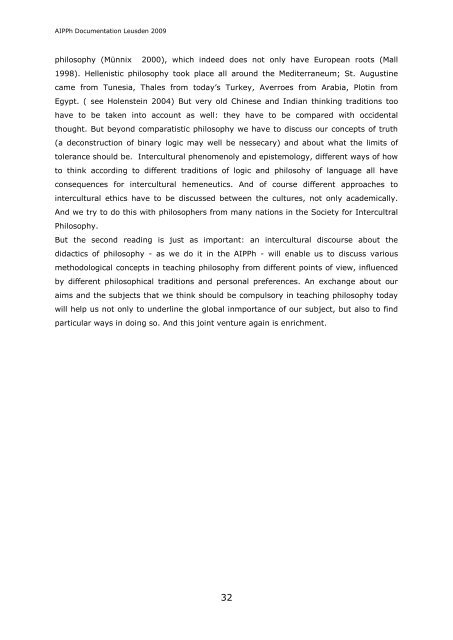AIPPh Documentation Leus<strong>de</strong>n 2009 philosophy (Münnix 2000), which in<strong>de</strong>ed does not only have European roots (Mall 1998). Hellenistic philosophy took place all around the Mediterraneum; St. Augustine came from Tunesia, Thales from today’s Turkey, Averroes from Arabia, Plotin from Egypt. ( see Holenstein 2004) But very old Chinese and Indian thinking traditions too have to be taken into account as well: they have to be compared with occi<strong>de</strong>ntal thought. But beyond comparatistic philosophy we have to discuss our concepts of truth (a <strong>de</strong>construction of binary logic may well be nessecary) and about what the limits of tolerance should be. Intercultural phenomenoly and epistemology, different ways of how to think according to different traditions of logic and philosohy of language all have consequences for intercultural hemeneutics. And of course different approaches to intercultural ethics have to be discussed between the cultures, not only aca<strong>de</strong>mically. And we try to do this with philosophers from many nations in the Society for Intercultral Philosophy. But the second reading is just as important: an intercultural discourse about the didactics of philosophy - as we do it in the AIPPh - will enable us to discuss various methodological concepts in teaching philosophy from different points of view, influenced by different philosophical traditions and personal preferences. An exchange about our aims and the subjects that we think should be compulsory in teaching philosophy today will help us not only to un<strong>de</strong>rline the global inmportance of our subject, but also to find particular ways in doing so. And this joint venture again is enrichment. 32
Bibliography: 33 AIPPh Documentation Leus<strong>de</strong>n 2009 Alexan<strong>de</strong>r, Jeffrey C,/Seidman, Steven (eds), Culture and Society. Contemporary Debates, Cambridge University Press NY 1990 Brahm Levey,Geoffrey, Secularism and Religion in a Multicultural Age, in: Brahm Levey, Jeffrey/Modood, Tariq (eds),Secularism, Religion and Multicultural Citizenship, Cambridge Univ. Press 2009 Friedman, William J., About Time, Cambridge Mass. 1990 Furch, Elisabeth (ed.), C.A.N.E.: Cultural Awareness in Europe. A reflection of Cultural Diversity in Europe, Wien 2003 Gid<strong>de</strong>ns, Anthony, Mo<strong>de</strong>rnity and Self-I<strong>de</strong>ntity. Self and Society in the Late Mo<strong>de</strong>rn Age, Stanford 1991 Ginsberg, Roy H., Demystifying the European Union, Lenham Plymouth 2007 Hastings, Adrian, The Construction of Nationhood, Cambridge University Press 1997. Holenstein, Elmar, Philosophie-Atlas. Orte und Wege <strong><strong>de</strong>s</strong> Denkens. Zürich 2004 Hume, David, An Enquiry Concerning The Principles of Morals, London 1751 James, William, A Pluralistic Universe. Cambridge Mass. 1977 James, William, Pragmatism. Meridian Cleveland 1967 James, William, Some Problems of Philosophy, Longmans NY 1919 Kant, Logik, (ed. Weische<strong>de</strong>l) WBG Darmstadt 1971 Keupp, Heiner et al. (eds), I<strong>de</strong>ntitätskonstruktionen in <strong>de</strong>r Spätmo<strong>de</strong>rne, Reinbek 2009 Koch, Anne, Das Verstehen <strong><strong>de</strong>s</strong> Frem<strong>de</strong>n, WBG Darmstadt 2003 Kraus, Peter A., A Union of Diversity. I<strong>de</strong>ntity and Polity-Building in Europe. Cambridge University Press NY 2008 Latour, Bruno, Whose Cosmos, Which cosmopolitics? in: Robertson-von Trotha,Caroline (ed), Kultur und Gerechtigkeit, Nomos Ba<strong>de</strong>n-Ba<strong>de</strong>n 2007 Lévinas, Emmanuel, Die Spur <strong><strong>de</strong>s</strong> An<strong>de</strong>ren, Alber Freiburg 1983 Levi-Strauss, Clau<strong>de</strong>, Das wil<strong>de</strong> Denken, Frankfurt 1973 Lyotard, Jean-Francois, Der Wi<strong>de</strong>rstreit, Fink München 1989 Mall, Ram Adhar, Die drei Geburtsorte <strong>de</strong>r Philosophie: China, Indien, Europa. Bonn 1989 Mead, George Herbert, Mind, Self and Society, Chicago 1974 Merleau-Ponty, Maurice, Die Phänomenologie <strong>de</strong>r Wahrnehmung, Berlin 1966 Münnix, Gabriele, Zum Ethos <strong>de</strong>r Pluralität. Postmo<strong>de</strong>rne und Multiperspektivität als Programm, LIT Münster 2003 Münnix, Gabriele, Philosophieren gegen Gewalt. Multiperspektivität und interkulturelle Hermeneutik, in: Bolz, Martin (ed.), Philosophieren in schwieriger Zeit, Münster Wien 2001 Münnix, Interkulturelle Philosophiedidaktik, in: Roth/Holzbrecher/Reich (egs), Fachdidaktik interkulturell, Leske und Budrich Opla<strong>de</strong>n 2000 Nagel, Thomas, The View from Nowhere, Oxford University Press 1986 Nietzsche, Friedrich, Götzendämmerung, Stuttgart 1964 Rescher, Nicholas, Pluralism. Against The Demand for Consensus. Clarendon Oxford 1996 Robertson, Roland, Globalization. London 1992 Rorty, Richard, Eine Kultur ohne Zentrum, Stuttgart 1993 Said, Edward W., Kultur und Imperialismus, Frankfurt 1994 Scott, Alan (ed.), The Limits of Globalization, London 1997 Sen, Amatya, I<strong>de</strong>ntity and Violence, The Illusion of Destinations, London 2006 Takayama, Mamoru, Die traditionelle I<strong>de</strong>e <strong>de</strong>r Eintracht im japanischen Denken, in: Bickmann, Claudia et al.(eds), Tradition und Traditionsbruch. Zwischen Skepsis und Dogmatik, Studies in intercultural Philosophy vol 16, Amsterdam New York 2006 Valentin, Joachim (ed), Weltreligionen im Film, Marburg 2002 Wal<strong>de</strong>nfels, Bernhard, Der Stachel <strong><strong>de</strong>s</strong> Frem<strong>de</strong>n, Frankfurt 1990


